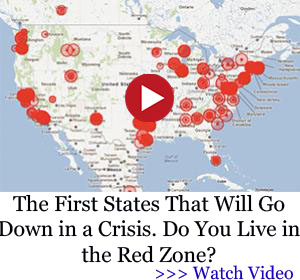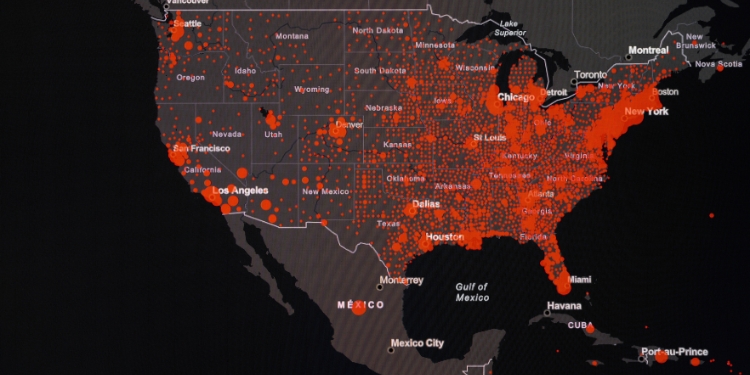It seems like every day there’s a new story about the economic woes befalling the world in general, and the United States in specific. It’s only right to be concerned that another recession or Great Depression is on the horizon. Just how far off it might be is worthy of debate.
What would happen if it got even worse than a new Great Depression? What would the fallout be if the dollar or the entire US economy collapses? How would your state and other states do if the dollar collapses, and the economy went through a prolonged overhaul?
To help you understand your risk, and the potential risks you might face if you decide to move, we decided to take a look at the worst states to be in when the economy collapses.
Hawaii
 With the high cost of living and most of their consumer goods being imported on a short time scale, Hawaii is by far the worst state to be in if the dollar collapses. If you live here, you already know how stressed the Hawaiian economy is on systemic and community levels. That’s only going to get worse if the value of the dollar crashes.
With the high cost of living and most of their consumer goods being imported on a short time scale, Hawaii is by far the worst state to be in if the dollar collapses. If you live here, you already know how stressed the Hawaiian economy is on systemic and community levels. That’s only going to get worse if the value of the dollar crashes.
If the collapse comes on gradually, like the slow economic death we’re seeing now, the cost of living will creep up to unmanageable levels. As it does, crime and civil unrest are sure to follow. If the collapse comes gradually, the number of homeless and displaced tourists will only escalate these problems.
Since Hawaii only has a two-week supply of perishable food at any one time, the disruption of the supply chain can lead to outright desperation. Especially since the existing agricultural infrastructure can’t be quickly converted to feed the existing population.
California
Many parts of California will be desperately inhospitable to be in if the US economy collapses. The state is funded by some of the highest taxes in the country, and when it becomes insolvent, many of the municipal services will dry up with it. This includes the artificial water infrastructure that much of the state relies on.
Areas with the highest population density along the coast will quickly turn to riots and looting to get the things they need. With very little means of escape, it’ll be hard not to be swept up in the waves of civil unrest.
Those who do manage to get out of the coastal cities will then flood inland. This will simply move the population problem to the agricultural areas of California. Which simply isn’t set up to support a massive, displaced population.
There’s also a silent threat in California’s Central Valley water management system. This aging infrastructure, or berms, small dams, and dikes is largely maintained by public funding. If the dollar collapses and the state can no longer maintain it, massive flooding could devastate the Central Valley like a ticking time bomb.
New York & New Jersey
The population density in much of the reliance on tax dollars and suspended debt also makes much of New York and New Jersey vulnerable after an economic collapse. Of course, the worst of it is going to be in the New York City area.
Here the population density and cost of living are staggeringly high. This spills over to New Jersey and into surrounding parts of upstate New York.
New York is also one of the world’s financial hubs. When the economy turns sour, the growing civil unrest could worsen as people turn on the physical headquarters of so many financial institutions.
New York and New Jersey’s municipal infrastructure is also aging. Some of it is more than a century old and truly is a Rube Goldberg nightmare. Without constant maintenance from tax-dollar funded programs water, sewer, electrical and transportation infrastructure will also collapse.
Illinois
Instantly, Illinois’ high cost of living, massive state debt, and reliance on public funding make it a bad state to live in if the economy collapses. Yet you also have to worry about the state’s aging and already poorly maintained infrastructure. Most of it relies on tax dollars and public funding to stay properly maintained.
Should the economy collapse the lack of funding will collapse Illinois’ infrastructure with it. I’m talking about more than just the trains, public transport, and water treatment systems of Chicago.
=> NASA’s SOLID Proof That A Disastrous SUPER DROUGHT Is Going To Hit Us Hard <=
The Mississippi, Ohio, and Illinois Rivers are all kept in check by infrastructure systems that are vulnerable to failure in an economic collapse. These major rivers are surrounded by extensive floodplains, that are now home to major population centers.
If the infrastructure fails, major cities like East St. Louis, Cairo, Peoria, Alton, Quincy, Rock Island and more will be inundated. Trying to rescue these cities from uncontrolled flooding will become impossible during such stressful economic times.
This will leave a massive population of displaced people trapped in Illinois by its flooded rivers. All of them will need food, shelter, and relief, without the economic funds available to do so. It has the potential to be a perfect storm of civil unrest.
Louisiana
The Louisiana economy relies heavily on industries like oil, gas, and tourism, which will suffer as the dollar suffers massive devaluation. Oil and gas are also very sensitive to economic changes in the global marketplace. In a full-scale economic collapse, these sources of income drying up would deliver a crippling blow to the financial health of the entire state of Louisianna.
Of course, Louisiana is also under the constant threat posed by major hurricanes. Katrina showed us just how difficult it can be when a hurricane relief effort is mismanaged and poorly funded. Imagine if another storm of that magnitude hit Louisiana after the US economy collapses.
It’s also worth bearing in mind that Louisiana has one of the highest poverty and crime rates in the country. If a severe economic downturn turns permanent, riots and civil unrest might become commonplace.
West Virginia
The largely undiversified economy of West Virginia, which is still heavily reliant on coal mining, makes it particularly vulnerable during a severe economic downturn. The state government and many of its programs are also reliant on federal funding, which would dry up in a total economic collapse.
This is also an area with a great deal of social kin bias in the hollows of the Appalachian Mountains. Historically, it’s led to a lot of infighting, which is still alive in some areas. This could hamper the sense of community needed to pool resources during sour economic times.
The transport and supply infrastructure in West Virginia is also old, and inefficient. All it would take is one or two aging bridges failing and large sections of the state would be cut off from incoming supplies.
Alaska
Fifty years ago, Alaska was one of the more resilient states capable of sustaining its population regardless of if the dollar collapsed or not. Unfortunately, today’s Alaska suffers from a staggeringly high cost of living, and reliance on federal funding to maintain civilization in its densely populated areas.
At the same time, rural and remote communities have become increasingly dependent on imported goods. Many of these are brought in seasonally, which could spell disaster if the US economy collapsed during the transport window.
=> This HIDDEN Survival Garden Will Keep You Well Fed When SHTF <=
The modern Alaskan economy is heavily dependent on oil. If the dollar suffered a collapse, or the world oil economy took a severe downturn it would severely impact Alaska’s oil industry. This would in turn cripple the state government’s ability to provide relief to the people.
Maine
Its economic isolation, aging population, and supply chain dependence make the coastal communities in the state of Maine particularly vulnerable during an economic collapse. Without the influx of tourism dollars, and reduced demand for their few export goods, Maine’s economy would flounder with the fading dollar.
The fact that Maine has the oldest median age of any state in the US, is also a serious cause for concern. A large percentage of the population relies on social programs and healthcare services that are subsidized by federal dollars.
If the economy collapses, the elderly receiving services in Maine could be desperately vulnerable. With no funding available to meet their immediate needs it will put a massive strain on the already taxed communities.
North Dakota
The harsh winters and their reliance on the performance of the oil industry could cripple North Dakota if there’s an economic collapse with no foreseeable recovery. The state has enjoyed an era of prosperity since oil was discovered there, but it’s also tied that prosperity to the energy sector.
If the dollar collapses, the agricultural industry and other sectors of the North Dakota economy won’t be strong enough to continue supporting the state. This will cause a massive recession to the lean times they faced in the latter part of the 20th century.
The winters in North Dakota can be cripplingly cold and the growing season is short. Should a harsh winter strike early during an economic collapse, the remote communities throughout the state could struggle to survive.
What Will Save Us All?
 At the end of the day, even if the economic collapse is unlikely at the moment, as preppers, we have to be ready for every single possible scenario, including this one. The truth is that there is just one thing that will help you deal with any hardship caused by any economic crash: knowledge.
At the end of the day, even if the economic collapse is unlikely at the moment, as preppers, we have to be ready for every single possible scenario, including this one. The truth is that there is just one thing that will help you deal with any hardship caused by any economic crash: knowledge.
The more you know, the better you will be prepared for everything life throws at you! This is why we always highlight how vital the information presented in many books is. Just look at these resources that you have available right now and that people living during the Great Depression did not:
- The Lost Ways 2 – The sequel to The Lost Ways, which helped over 250,000 Americans prepare for the next crisis. This second edition offers all that the first book had plus extras like how to deal with food shortages, lost foods, how to build log houses like the pioneers, how to identify wild plants, how to get high purity charcoal the old fashioned way, how to dig wells fast, and so much more. Learn more here!
- The Lost Book Of Herbal Remedies II – Normally available just for those who bought the first book in the series, but presented to Ask A Prepper readers through the close friendship between Claude Davis and author Nicole Apelian. This book is an encyclopedia of lost herbal remedies and knowledge. over 207 of them. Learn more about this fantastic opportunity for AAP readers here.
- No Grid Survival Projects – Most people will probably not survive an EMP without having the knowledge in this book. It teaches you through a step-by-step instruction system how to build EVERYTHING you need to survive if the grid ever goes down, which is highly possible if economy collapses. Learn how to grow food, harvest water, create electricity, and much more here.
- The Amish Ways Book – Learn how to outlive an economic collapse from people who would not be affected by it, the Amish. The fountain of knowledge present in the book teaches you countless survival projects. The Amish have been thriving forever and are masters of self-reliance. Lack of electricity does not affect them. There is never famine. Learn why here.
- Easy Cellar – Learn how to build a root cellar that can preserve your entire food stockpile without relying n electricity.
- A Navy Seal’s Bug-In Guide – The ONLY survival book that teaches you everything you need to know about how to turn your house into literally the safest place on Earth. It teaches you how and how much to stockpile, how to completely looter-proof your property, and how to still have power when the grid is down, among many others. This guide is all you need to be completely safe when you bug-in, which is exactly what most people will do. See more about what you learn in the guide here.
I am sure many of you already own at least one of the books above. If you do not, just read more about them and you will surely figure out why they are so highly respected by the community. Take it one step further and even take a look at our Store page, where even more very helpful books are presented.
Remember! Knowledge is power. Books do not need electricity to run like your phone, or the internet to access the data. They can easily be stored in your home and every single one might save your life.
You may also like:
 When This Happens, The Economic Collapse Will Begin
When This Happens, The Economic Collapse Will Begin
Intelligence: How to Stay One Step Ahead of the Bad Guys (Video)
What Happens If China Becomes The Ruling Economic Power Of The World














